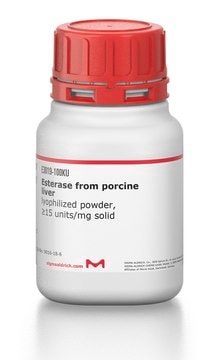77869
(S)-(−)-α-Methylbenzylamine
for chiral derivatization, LiChropur™, ≥99.0%
Synonym(s):
(S)-(−)-1-Phenylethylamine
About This Item
Recommended Products
grade
for chiral derivatization
Quality Level
vapor pressure
0.5 mmHg ( 20 °C)
Assay
≥99.0% (sum of enantiomers, GC)
≥99.0%
form
liquid
optical activity
[α]20/D −30±1°, c = 10% in ethanol
optical purity
enantiomeric ratio: ≥99.5:0.5 (GC)
quality
LiChropur™
technique(s)
HPLC: suitable
refractive index
n20/D 1.526 (lit.)
n20/D 1.528
bp
187 °C (lit.)
density
0.94 g/mL at 25 °C (lit.)
storage temp.
2-8°C
SMILES string
C[C@H](N)c1ccccc1
InChI
1S/C8H11N/c1-7(9)8-5-3-2-4-6-8/h2-7H,9H2,1H3/t7-/m0/s1
InChI key
RQEUFEKYXDPUSK-ZETCQYMHSA-N
Looking for similar products? Visit Product Comparison Guide
General description
Application
Legal Information
Signal Word
Danger
Hazard Statements
Precautionary Statements
Hazard Classifications
Acute Tox. 3 Dermal - Acute Tox. 4 Oral - Skin Corr. 1B
Storage Class Code
6.1A - Combustible acute toxic Cat. 1 and 2 / very toxic hazardous materials
WGK
WGK 1
Flash Point(F)
158.0 °F - closed cup
Flash Point(C)
70 °C - closed cup
Personal Protective Equipment
Choose from one of the most recent versions:
Already Own This Product?
Find documentation for the products that you have recently purchased in the Document Library.
Customers Also Viewed
Chromatograms
Our team of scientists has experience in all areas of research including Life Science, Material Science, Chemical Synthesis, Chromatography, Analytical and many others.
Contact Technical Service














